Although it is very stressful for the family of a pet that suddenly becomes blind, you will soon be proud and amazed at how well they cope. The families of pets who have been in our care are happy to share their stories.
Bella
Little Bella suffered from a condition called lens luxation of both her eyes. This occurs when the lens, which is a disc-shaped structure required for the eye to focus, becomes dislodged from its normal position in the eye. Although Bella was initially successfully treated with eye drops, the eyes eventually developed glaucoma and became blind and painful. Thus, it was in Bella’s best interest to have them removed. This procedure is called enucleation. Bella recovered brilliantly from surgery and her owners were amazed at how well she has adjusted:
“She is now 11 and she is doing so well. She is still acting like a puppy and playing with her toys. It’s amazing. She loves running on the beaches and walking round the shops. It’s so amazing how she had adapted to it all. Thank you for all your support!”
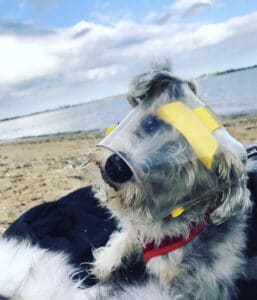
Bourbon
Bourbon suffered from severe inflammation of both of his eyes (uveitis). The eyes developed retinal detachment and glaucoma becoming painful and blind. His eyes were removed to alleviate the pain. Only a few months after his surgery his owner reported that he was doing so well that he had even stopped bumping into things!
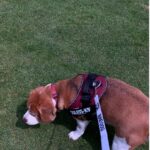

Bramble
Bramble lost her vision due to Sudden Acquired Retinal Degeneration Syndrome (SARDS). This however has not stop her enjoying her life just as much as she had before losing her sight.
Her owner commented: “Bramble gained confidence daily and did mental mapping of the rooms in the house. I bought her a ‘Halo’ to wear that stops her bumping her head and she now whizzes round the house. She can go up and down the stairs, but we do it with a harness and short lead, we don’t allow her to go up or down unaccompanied. She is a lot happier now she is more independent. Hopefully we will be taking her once a week to my dog walkers doggy day care where she will be able to meet back up with her doggie pals. I will keep her on a lead and be with her under my supervision. She will have a fun time.”
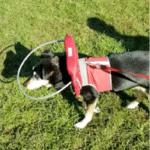
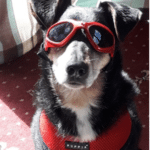
Rosie
Rosie first lost her vision due to primary glaucoma which eventually stopped responding to medication. Rosie had both eyes removed to free her from pain.
Her owners said “I cannot explain the initial shock of our beautiful girl Rosie losing both of her eyes; however she bounced back and did not let it hold her back. Dogs are so resilient and amazing at adapting to what would be a life changing operation to humans, it’s never held Rosie back from doing anything’’


Rusty
Rusty lost his vision due to Sudden Acquired Retinal Degeneration Syndrome (SARDS). This is his owner’s uplifting story:
“If you’re reading this, it’s probably because you’ve been told that your dog is going blind, or has gone blind. You’ll be in a state of confusion, distress and overwhelming worry. You’ll be wondering if your dog is going to be ok, or perhaps even that you think their life is going to be so bad it might be kinder to have them put to sleep. Before you make any decisions, and before you get even more upset, let me tell you my story, with my dog Rusty…
“Rusty was always very active, running after a ball, and poking his nose in everywhere. We walked for about 5 miles a day, but with his running back and forth he would probably do double that! Christmas 2018 his vision was fine, we spent a portion of Christmas day with me throwing him a ball into the sea and he would swim out and retrieve it. However, by January 4th I knew there was a problem, because he would run after his ball in the park and couldn’t find it, even though it was right at his feet. After various vets visits and consultations it became clear he had no vision at all.
“Needless to say, it was a huge shock – this was not one of life’s plot twists that I was prepared for. Rusty did get very depressed, and it was difficult to get him to do anything for a couple of weeks. But then I realised something – Rusty is a dog who just happens to be blind. He’s NOT a blind dog. It’s vital that you continue to treat your dog as a dog first, and a blind dog second. If you start treating him or her with kid gloves, your dog will sense this, and react accordingly.
“I then expected Rusty to walk out of the front door, work out where the car is, go to the boot, wait for me to open it, and then jump up and into it. Sometimes he missed the boot and scrabbled around. So we would start again, and second time around, he got it. When we got to the woods he was off his lead as soon as possible, sniffing out interesting scents, walking along the paths, going around corners with little or no guidance. When we went somewhere new, such as a friend’s garden he would map it out. He’d start at the fence (or whatever) and work his way around the outside first, then start to move inwards. Sometimes he walked into things, and then stopped, worked his way around them and carried on. Over the course of perhaps an hour he would have the entire area mapped out with a high degree of accuracy. He used his senses of smell and hearing to great effect – if you didn’t know that he was blind you probably wouldn’t realise it.
“It’s was the same at home. He knew where all the furniture was, where his bowls were, where the stairs were, the dimensions of the garden and so on. I did make a few concessions for him – after he fell in the fishpond twice I put a small fence around it. I put heavily textured mats at the top and bottom of the stairs so he knew when he had reached them, and I got piping insulation foam and put those on the edges of some doors and tables. I also make sure that I don’t move the furniture around, and tidied up anything that he might trip over such as shoes etc.
“Someone said something to me very early on which I found very helpful ‘he doesn’t know that the rest of the world hasn’t gone dark as well’. Dogs do not think the way humans do. They live far more in the minute, and they are more accepting of a change in circumstance. He was not frightened, partly because we were not frightened for him. His other senses really kicked in, I’d certainly suggest doing some research on how dogs smell, because it will really give you a lot of reassurance that a lack of sight doesn’t mean a lack of quality in your dog’s life.
“I’m not going to say that everything is perfect – of course it isn’t. Rusty sometimes lost his mental map, and would walk straight into a wall, and might then panic and walk into another one. I simply held him, talked to him until he has calmed down, then I led him back to a place he knew well and I could almost see him reboot his mental map and go off again. You may find your dog’s habits change for a while – you might need to reteach them about going outside to do their business. You may need to teach some new commands; ‘this side’, ‘careful’, ‘wait’, ‘stop’, ‘round the corner’ and ‘straight ahead’ are ones that I found useful. He picked the new ones up really quickly.
“I’d suggest getting some toys that have a sound element to them – balls with bells in for example. I also wear a set of bells on my keyring. You can get some very good harnesses, collars and sheaths for your dog’s lead which say ‘blind dog’. Expect strange reactions from people – they’re often very inquisitive, and they will often assume you’re training your dog to be a guide dog, and that it’s you who is the blind one. Some people also get very surprised that dogs can go blind!
“In summary, your future life with your dog who happens to be blind is going to be fine. They will manage perfectly well, they will continue to enjoy their life as much as they have ever done, and they will adjust to the new normal far, far quicker than you will. Trust your dog, show confidence in your dog, believe that your dog can manage perfectly well and they will pick up on that from you, and believe it or not, they will. Blindness is one of the least important aspects of your dog’’.
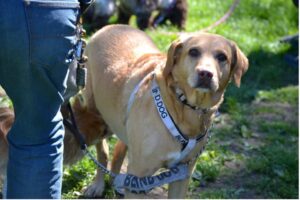
Parsley
Little Parsley was rescued by a family who gave him a loving home. He developed secondary painful glaucoma after cataract surgery which did not respond to medical and surgical treatment. Both his eyes had to be removed. Parsley adapted really well and gained a dog friend who guided him. His owners shared his story:
‘In 2019 Parsley was blind, living in a rescue kennel, desperately underweight and so sad – he didn’t have anyone and was sent from Ireland to Wales. My friend saw him and sent me his picture on a Monday, I picked him up on the Saturday and promised him I would do everything I could to give him a wonderful life.! For the rest of his life he had a kind home, a family who loved and accepted him no matter what; food, love and walks and toys and cuddles on tap. He had such a big heart. I also promised we would go to the beach because my other dogs love the beach. And we did! And he saw, smelled and felt the sea for the first time! He really has been a lesson to us.’’
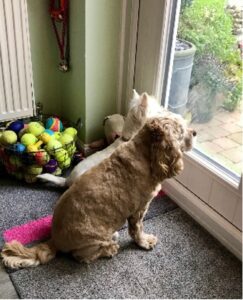
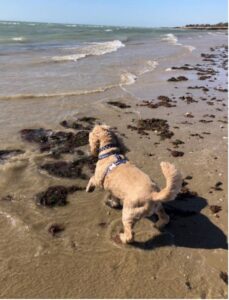
Sweep
Sweep is a good example of how cats, as well as dogs, can adapt to blindness. Sweep lost both his eyes a few years ago due to anterior lens luxation (a condition where the lens moves into the front segment of the eye) and high intraocular pressure (glaucoma) and ocular pain. He recovered very well after surgery and he was able to adjust and coped very well. He sadly passed away Summer 2021 and his lovely owners wished to share his story with us to help other owners understand that blind pets can have a very good quality of life.
“Our little Sweep loved chilling out on the sofa, but he was always a little jumpy when people rang the doorbell or come charging in through the door. He walked extremely carefully and occasionally bumped into things, sometimes a little harder than others, but he found his food and the litter tray which was out through the cat flap and onto the ‘catio’, this was his safe haven. When it was quiet and the sun was shining, he liked to spend some time out on the ‘catio’, soaking up the sun’s rays and listening to the noises.
“It took some time for him to learn how to get around but it was a lot harder for us, the family members, to get used to the new Sweep; however later we were truly amazed how well he was coping, our little clever Sweep. Thank you once again for the support, care and love given to Sweep while he was in your care.”
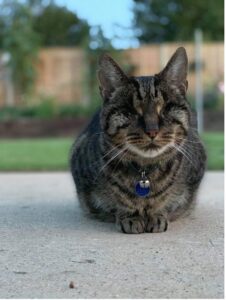
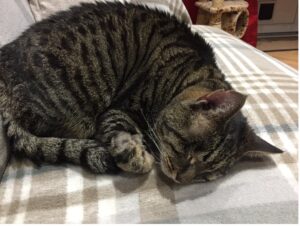
Further reading:
Bedard, K. M., Myrna, K. E., & Diehl, K. A. Preliminary evaluation of effect of two visual aid devices on navigation in blind dogs. Journal of Small Animal Practice. 2020. doi:10.1111/jsap.13120
Hamzianpour et al. Bilateral enucleation in dogs: A review of owner perceptions and satisfaction. Veterinary Ophthalmology, 2018. doi: 10.1111/vop.12623
